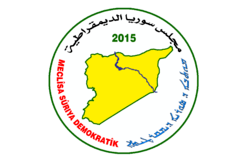Movement for a Democratic Society
 |
|---|
| This article is part of a series on the politics and government of Democratic Federation of Northern Syria |
|
Symbols |
|
|
Party alliances
|
The Movement for a Democratic Society (Kurdish: Tevgera Civaka Demokratîk, TEV-DEM,[1] Arabic: حركة المجتمع الديمقراطي, Classical Syriac: ܙܘܥܐ ܕܟܢܫܐ ܕܝܡܩܪܐܛܝܐ, translit. Zaw'o d'Kensho Demoqraṭoyo[2]) is the coalition governing the de facto autonomous region of the Democratic Federation of Northern Syria (DFNS). The leading party in the coalition is the Democratic Union Party (PYD).
Background in the Arab Spring
As the Arab Spring reached Syria in early 2011, protests spread to the Kurdish areas in the north. The PYD, which had a large presence among Syrian Kurds, was actively competing with the Kurdish National Council. One of the main points of divergence related to the PYD’s stance of urging regime change, yet rejecting foreign intervention and alignment with the Syrian opposition. It claimed to offer a ‘third line’ within the Syrian conflict, centred around self-defence and the primacy of non-violent solutions which did not support either the regime or the opposition, based on the organization of society and the formation of cultural, social, economic and political institutions in order to achieve "self-administration for the people".
Despite this competition, the KNC and PYD agreed to work together within the Kurdish Supreme Committee (DBK), established in 2012 in Erbil. However, as local popular support tilted towards the PYD, the KNC eventually withdrew its participation. It accused the PYD of monopolizing decision-making and harassing its activists. The PYD responded by accusing the KNC of trying to establish a competing parallel force and divide the region into competing zones of influence, risking Kurdish infighting. In November 2013 the PYD, under the TEV-DEM umbrella, unilaterally announced the creation of an interim administration for the region.[3]
Ideology and programme
By December 2013, TEV-DEM switched to a new governance model, dubbed the ‘democratic self-administration project’ with stronger ties to the PYD's own democratic confederalist ideology. This came to replace the ‘interim administration project’ previously agreed upon with the KNC.
The Constitution of the Democratic Federation of Northern Syria of July 2016 emphasizes multi-ethnic recognition in line with democratic confederalist ideology and dedicates articles 8–53 to basic principles of rights, representation and personal freedoms that match the provisions of the Universal Declaration of Human Rights. It also contains a number of other principles so far never applied in Syria and neighboring countries, such as the inadmissibility of civilians being tried by military courts and the abolition of the death penalty. In addition, the PYD adopts a progressive gender equality standard in its governance structures, with equal gender representation in all administrations and the establishment of a ministry for "Women’s Liberation" – a standard that has been largely adhered to, including within the military.
Despite the radical leftist roots of the PYD in the decades-long connection to the ideology of Öcalan and the PKK, these multi-ethnic and secular components of the constitution met some fundamental requirements of Western international backers opposing the Syrian regime. The model of local administration in the DFNS has fostered a number of positive developments, such as a focus on individual personal freedoms and the local administration has helped to reduce the repercussions of the Syrian war on the population in Northern Syria by filling the vacuum left by the withdrawal of Assad’s forces from northern Syria; its nuanced position vis-à-vis the Syrian government allowed a continuation of the basic services previously rendered by the state.[3]
List of constituent parties
| Name | Leader |
|---|---|
| Democratic Union Party (PYD) | Salih Muslim & Asya Abdullah |
| Syriac Union Party (SUP) | Ishow Gowriye |
| Syrian Kurds' Democratic Peace Party (PADKS) | Telal Mihemed |
| Kurdistan Liberal Union Party (PYLK) | Ferhad Têlo |
Executive Committee members
References
- ↑ "The Project of a Democratic Syria: Movement for a Democratic Society, Rojava". 17 February 2015. Retrieved 14 August 2017.
- ↑ "ܟܢܘܫܝܐ ܕܦܕܪܠܝܘܬܐ ܡܛܠ ܕܘܪܫܐ ܕܛܘܘܪ̈ܐ ܚܪ̈ܝܐ ܒܝܪܚܐ ܩܕܡܐ". Retrieved 14 August 2017.
- 1 2 Sary, Ghadi (September 2016). "Kurdish Self-governance in Syria: Survival and Ambition" (PDF). Chatham House. p. 11. Retrieved 6 February 2017.
- ↑ "Syrian Kurdish groups split over autonomy decision". 5 February 2014. Retrieved 14 August 2017.
- ↑ "TEV-DEM: 'There Can Be No Democratic Syria Without Rojava'". 27 October 2015. Retrieved 14 August 2017.